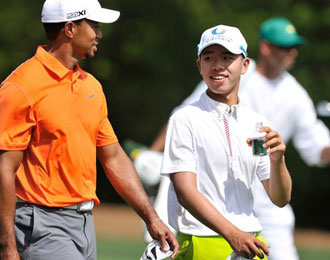Chinese prodigies are exploding onto the global golfing scene thanks to China’s grand ambition to become a power in the sport in time for the 2016 Rio de Janeiro Olympics.
Ever since 2009 when the International Olympic Committee (IOC) voted to return golf to the Olympics for the 2016 Games after a 112-year absence, China has rushed to bury its communist aversion for the bourgeois sport and invested lavishly on a program to identify and push a generation of young golfers up the global rankings. The top 15 in the world in each gender win automatic berths in the Rio games. Another 45 per gender will be chosen through elimination rounds in which nations without at least two in the top 15 can earn up to two slots.
China has hired Australian Greg Norman to identify and advise the nation’s top young golfing talent. It has also hired Scotsman Michael Dickie to coach the women’s Olympic team. The program, based on Shanghai, puts 15 promising girls through a rigorous six-days-per-week regimen that includes five hours a day on golf and two on fitness training. The government also takes care of all arrangements and expenses for participating in tournaments around the world.
The national golfing program has already produced impressive results, though it can’t take full credit for Feng Shanshan, 23, the first Chinese golfer to win a major. Last June at New York’s Locust Hill Country Club Feng won the 2012 LPGA Championship by two strokes with a 6-under 282. She had turned pro back in 2007, at the age of 18, before the national golfing program started up, and is currently ranked 8th in the world. She doesn’t train with the team in Shanghai but will likely win a berth to Rio.
Several other Chinese golfers have been garnering nearly as much attention as Feng, mainly because their golfing talents are paired with startling youth.
Guan Tianlang, 14, is the youngest ever to play at Augusta, an 80-year-old masters event which opened Thursday. Before Guan its youngest participant was 16-year-old Matteo Manassero. Guan won his Augusta berth by beating a field of senior golfers last year at the Asia-Pacific Amateur Championship in Thailand. Last year, at the age of 13, Guan became the youngest ever to play in a European Tour event.
Andy Zhang was only 14 last year when he became the youngest player in the history of the US Open while Jing Yan took that distinction at last year’s Women’s British Open at the age of 16. And in March Ye Wocheng, 12, became the youngest golfer to qualify for a European Tour event.
These distinctions are remarkable when one considers that the entire pool of teens playing golf in China is estimated at no more than 600 boys and girls. The youthful marks they’re setting seems to be a preview of the intensity with which Chinese are devoting themselves to a sport that had been abolished during the Cultural Revolution. It wasn’t until 1984 that a golf course was allowed to open in China. Today there are at least 600 courses, three times as many as a decade ago, and perhaps only a third of the number likely to be in operation a decade hence.


